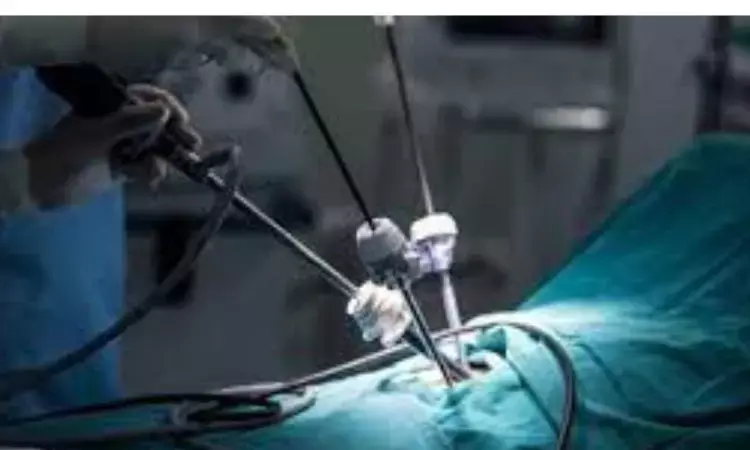- Home
- Medical news & Guidelines
- Anesthesiology
- Cardiology and CTVS
- Critical Care
- Dentistry
- Dermatology
- Diabetes and Endocrinology
- ENT
- Gastroenterology
- Medicine
- Nephrology
- Neurology
- Obstretics-Gynaecology
- Oncology
- Ophthalmology
- Orthopaedics
- Pediatrics-Neonatology
- Psychiatry
- Pulmonology
- Radiology
- Surgery
- Urology
- Laboratory Medicine
- Diet
- Nursing
- Paramedical
- Physiotherapy
- Health news
- Fact Check
- Bone Health Fact Check
- Brain Health Fact Check
- Cancer Related Fact Check
- Child Care Fact Check
- Dental and oral health fact check
- Diabetes and metabolic health fact check
- Diet and Nutrition Fact Check
- Eye and ENT Care Fact Check
- Fitness fact check
- Gut health fact check
- Heart health fact check
- Kidney health fact check
- Medical education fact check
- Men's health fact check
- Respiratory fact check
- Skin and hair care fact check
- Vaccine and Immunization fact check
- Women's health fact check
- AYUSH
- State News
- Andaman and Nicobar Islands
- Andhra Pradesh
- Arunachal Pradesh
- Assam
- Bihar
- Chandigarh
- Chattisgarh
- Dadra and Nagar Haveli
- Daman and Diu
- Delhi
- Goa
- Gujarat
- Haryana
- Himachal Pradesh
- Jammu & Kashmir
- Jharkhand
- Karnataka
- Kerala
- Ladakh
- Lakshadweep
- Madhya Pradesh
- Maharashtra
- Manipur
- Meghalaya
- Mizoram
- Nagaland
- Odisha
- Puducherry
- Punjab
- Rajasthan
- Sikkim
- Tamil Nadu
- Telangana
- Tripura
- Uttar Pradesh
- Uttrakhand
- West Bengal
- Medical Education
- Industry
Minimally invasive lymph node removal may guide treatment for women with locally advanced cervical cancer: Study

Cervical cancer ranks as the fourth most prevalent cancer among women worldwide. Recent study evaluated the outcomes of minimal access retroperitoneal para-aortic lymphadenectomy in patients with locally advanced cervical cancer (stage 1b3-3b) at a single cancer center in the UK. The researchers reviewed medical records of 191 patients diagnosed with stage 1b3-3b cervical cancer between 2005-2016. 124 of these patients were scheduled to undergo retroperitoneal para-aortic lymphadenectomy, while 67 did not have the procedure for various reasons. The procedure was abandoned in 14 patients due to technical difficulties. In total, 110 patients underwent the para-aortic lymph node removal procedure. The intraoperative and postoperative complication rates were 8.8% and 5.3% respectively. The mean lymph node count was 11.7. Para-aortic nodes were positive on pre-operative imaging in 5 cases, and cancer was found in the lymph nodes of 10 (8.9%) patients on histological examination. This led to a change in radiotherapy management in 8 (8%) patients. The mean overall survival was 42.8 months. Patients who underwent the lymph node removal procedure had significantly longer survival (50.6 months) compared to those who did not have the surgery (31.3 months). Adenocarcinoma histology was associated with better prognosis. The researchers conclude that the minimal access retroperitoneal para-aortic lymphadenectomy is an acceptable procedure that can guide treatment in women with locally advanced cervical cancer. However, the benefit of this approach on overall survival remains unclear and requires further research, potentially through a well-designed randomized controlled trial.
Key Points
Here are the 6 key points from the research paper:
1. The study evaluated the outcomes of minimal access retroperitoneal para-aortic lymphadenectomy in patients with locally advanced cervical cancer (stage 1b3-3b) at a single cancer center in the UK.
2. The researchers reviewed medical records of 191 patients, 124 of whom were scheduled to undergo the lymph node removal procedure, while 67 did not. The procedure was abandoned in 14 patients due to technical difficulties.
3. In total, 110 patients underwent the para-aortic lymph node removal procedure. The intraoperative and postoperative complication rates were 8.8% and 5.3% respectively. The mean lymph node count was 11.7. Para-aortic nodes were positive on pre-operative imaging in 5 cases, and cancer was found in the lymph nodes of 10 (8.9%) patients, leading to a change in radiotherapy management in 8 (8%) patients.
4. The mean overall survival was 42.8 months. Patients who underwent the lymph node removal procedure had significantly longer survival (50.6 months) compared to those who did not have the surgery (31.3 months). Adenocarcinoma histology was associated with better prognosis.
5. The researchers conclude that the minimal access retroperitoneal para-aortic lymphadenectomy is an acceptable procedure that can guide treatment in women with locally advanced cervical cancer.
6. However, the benefit of this approach on overall survival remains unclear and requires further research, potentially through a well-designed randomized controlled trial.
Reference-
Claire Newton, Radha Graham, Viola Liberale, Matthew Burnell, Usha Menon, Tim Mould, Adeola Olaitan, Nicola Macdonald, Martin Widschwendter, Kostas Doufekas, Mary McCormack, Anita Mitra, Rupali Arora & Ranjit Manchanda (2024) Outcomes of minimal access retroperitoneal para-aortic lymphadenectomy in patients with locally advanced cervical cancer, Journal of Obstetrics and Gynaecology, 44:1, 2344529, DOI:
10.1080/01443615.2024.234452
Dr Kamal Kant Kohli-MBBS, DTCD- a chest specialist with more than 30 years of practice and a flair for writing clinical articles, Dr Kamal Kant Kohli joined Medical Dialogues as a Chief Editor of Medical News. Besides writing articles, as an editor, he proofreads and verifies all the medical content published on Medical Dialogues including those coming from journals, studies,medical conferences,guidelines etc. Email: drkohli@medicaldialogues.in. Contact no. 011-43720751


